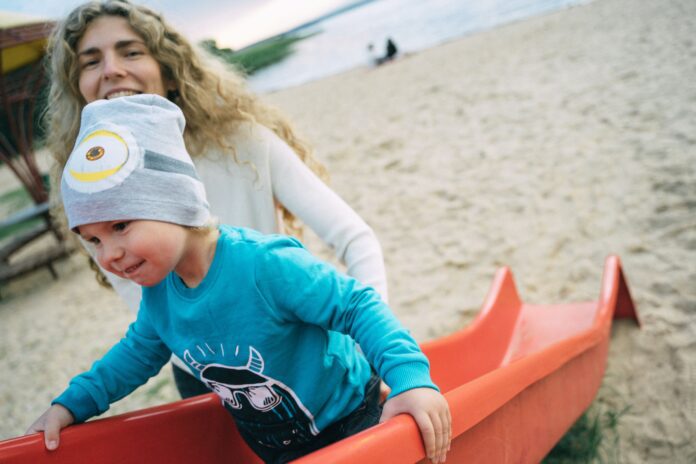We all know that one of life’s greatest joys, when you’re young, is getting to go to the playground. Whether you’re rocking on a swing set, twirling around the merry go round, or sliding down the slide, playgrounds are a mecca of outdoor fun. Unfortunately, as any parent of a tiny daredevil knows, the fun can sometimes lead to injury. That’s why it’s essential to understand playground safety.
So, if want your kids to have fun but stay safe, this guide will provide you with top tips and advice.
Causes of Playground Injuries
Playgrounds can be a fun and enjoyable place for children to play, but they can also be the site of many injuries if certain safety precautions are not taken.
Poorly maintained equipment
Equipment that is damaged, rusted, or in disrepair can cause accidents and injuries. For example, rusty bolts can cause equipment to collapse, and loose or missing parts can cause children to fall. Additionally, playground equipment should be inspected regularly to identify and repair any hazards or damages.
Unsafe Playground Design
Unsafe playground design is also a common cause of playground injuries. Playgrounds should be designed with safety in mind and comply with relevant safety standards. This includes providing a safe surface for children to play on, such as mulch or rubber, and ensuring that equipment is designed for the age and size of the intended users. Furthermore, playgrounds should be designed to prevent entrapment or strangulation hazards, such as gaps between equipment that a child’s head can get stuck in or ropes that can cause choking.
Inadequate Safety Measures
Finally, inadequate safety measures are another cause of playground injuries. Safety measures can include fences or barriers to prevent access to unsafe areas, proper signage to indicate age-appropriate play areas, and sufficient lighting to ensure visibility during evening hours.
Getting Ready to go to the Playground
When it comes to playground safety, it is important for children to dress appropriately for the activities they will be engaging in. Loose clothing or clothing with drawstrings, jewelry, and accessories can get caught on equipment and cause accidents. It is also important for children to wear closed-toe shoes with good grip to prevent slips and falls.
Wearing sunscreen and hats can protect children from harmful sun exposure, especially during peak hours. In colder months, layering clothing and wearing gloves and hats can help children stay warm and avoid hypothermia. It is also important to dress children appropriately for the playground surface, such as avoiding sandals on hot pavements or wearing pants on rough surfaces. By dressing appropriately for the playground, children can reduce their risk of injury and have a safer and more enjoyable play experience.
Inspect the Playground Equipment
Inspecting playground equipment should be everyone’s first line of defense against injuries. Before a child is even allowed to use the playground, adults should take a few minutes to look over the condition of the equipment and area. Look for any possible hazards or broken pieces that could lead to injuries or worse.
Be sure to inspect each piece of equipment individually looking for sharp edges, and loose screws. Check out the equipment for cracks and potential splinter hazards. Nothing should be left unchecked on the playground – from the bars on monkey bars all the way up to the slide. Ensure that all surface material is properly filled in and all shock-absorbing material remains soft and firmly in place.
Finally, examine any signs posted around the area regarding safety and usage rules as well as any age restrictions.
Establish Ground Rules and Guidelines
Establishing ground rules and guidelines for your children when playing on the playground is one of the most important safety measures you can take. This helps ensure that everyone plays safe, knows the expectations, and can keep an eye out for potential dangers. Ground rules and guidelines provide an opportunity to discuss appropriate behaviours and also demonstrate that playgrounds aren’t just places for unbridled horseplay- they should be environments designed for learning, growth, and friendship as well.
Aim for reasonable expectations that are age-appropriate and emphasised with positive reinforcement. Setting realistic expectations can teach your kids how to be responsible and self-aware, which will promote healthy habits both in and out of playtime.
Additionally, it is important that all adults agree upon these ground rules and guidelines so everyone is on the same page about what is expected and appropriate behaviours. Consistency among adults makes it easier for children to stay safe without feeling over regulated – that way they are more likely to follow directions if there ever arises a dangerous situation.
Careful Supervision is Key
Careful supervision is key when it comes to playground safety and will go a long way in mitigating potential risks. Parents or guardians should always be present and closely observing whenever their child is playing on the playground.
It’s all too easy to be distracted by your mobile phone or when chatting with friends but kids tend to be more reckless than grown-ups. Having an adult nearby means that dangerous or hazardous situations can be quickly noticed and responded to before anything serious can happen.
First Aid for Playground Injuries
Despite taking precautions and following safety rules, accidents can still happen on the playground. In the event of an injury, it is important to know how to administer first aid properly.
For minor injuries such as cuts and scrapes, the wound should be washed thoroughly with soap and water and covered with a clean, dry bandage. For more serious injuries such as sprains, strains, or fractures, the child should be taken to a medical professional immediately.
In the case of head injuries, parents or caregivers should be alert for any signs of concussion, such as headaches, nausea, confusion, or unconsciousness. If any of these symptoms are present, the child should be taken to a hospital immediately. time limits for claims involving children
Negligence By the Owner of the Playground
If a child is injured on a playground due to the negligence of the owner or operator of the playground, it may be possible to take legal action for compensation. This can include compensation for medical expenses, pain and suffering, and other damages resulting from the injury.
Many playgrounds have signs or waivers posted that attempt to limit the liability of the playground owner or operator. However, it is important to understand that such signs or waivers may not absolve the owner or operator of their responsibility to provide a safe environment for children to play.
To take legal action, it is recommended to consult with a personal injury lawyer who has experience in playground accident cases. The lawyer can advise on the strength of the case and provide guidance on the legal process. In order to establish negligence, the lawyer will need to prove that the playground owner or operator breached their duty of care in maintaining a safe environment for children to play and that the breach directly caused the child’s injury.
It is important to note that, in the UK, time limits for claims involving children are different from those for adults. This means that the three-year timescale for making a personal injury claim does not apply to a child under the age of eighteen. Instead, the claim may be made at any point up until their eighteenth birthday, and if at this point the claim has not been started, then it may commence at any point up until their twenty-first birthday.
Help keep news FREE for our readers
Supporting your local community newspaper/online news outlet is crucial now more than ever. If you believe in independent journalism, then consider making a valuable contribution by making a one-time or monthly donation. We operate in rural areas where providing unbiased news can be challenging. Read More About Supporting The West Wales Chronicle


























